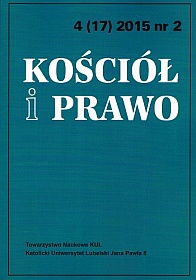Supervisory Authority of the Ordinary Concerning Administration of Ecclesiastical Goods (can. 1276 § 1-2)
Abstract
This paper concerns the supervisory authority of the ordinary concerning ecclesiastical goods. The question which the Author poses is: What are Ordinary’s competences in relation to the administration of all the goods which belong to public juridical persons subject to him? The content of the study shows that the essence of supervisory authority is administration to ensure that abuses do not creep into ecclesiastical discipline. In this context, can. 392 §2 is a clarification of can. 1276 §1-2. The scope of the supervisory authority of the Ordinary relates mainly to: issue special instructions, within the limits of universal and particular law; issue relevant permissions of acts of extraordinary administration; intervene in case of negligence of administrator.
The 1983 Code has determined two limits in performing the supervisory authority: the first concerns public juridical persons subject to the authority of the Ordinary. The second requirement is to observe legal titles which may give greater rights. For example the religious house of diocesan right.
Canon law in regard to supervision, is the instrument of protection of ecclesiastical goods, in order to ensure that they are used in accordance with the objectives of ecclesiastical goods. The supervision right is to help undertake greater responsibility for ecclesiastical goods and to build greater confidence in the people who administer them.
References
Adamowicz, Leszek. 2003. „Władza biskupa diecezjalnego w odniesieniu do majątku kościelnego.” W Biskup pasterz diecezji. Materiały z sympozjum »Biskup diecezjalny a duszpasterstwo i apostolstwo wiernych, red. Piotr Majer, 121-140. Kraków: Wydawnictwo Naukowe PAT.
Althaus, Rüdiger. 1999. „Buch V. Die zeitlichen Güter der Kirche.” W Münsterischer Kommentar zum Codex Iuris Canonici, red. Klaus Lüdicke, Bd. 4, 1276/2. Essen: Ludgerus.
Aznar, Federico et R. Gil. 1993. La administración de los bienes temporales de la Iglesi. Salamanca: Publicationes Universidad Pontifica Salamanca.
Banaszak, Bogusław. 2007. „Nadzór.” W Encyklopedia prawa, red. Urszula Kalina-Prasznic, 409. Warszawa: Wydawnictwo C.H. Beck.
Dyduch, Jan. 2003. „Troska biskupa diecezjalnego o nauczanie i wychowanie w szkołach.” W Biskup pasterz diecezji. Materiały z sympozjum „Biskup diecezjalny a duszpasterstwo i apostolstwo wiernych”, red. Piotr Majer, 47-67. Kraków: Wydawnictwo Naukowe PAT.
Grabowski, Ignacy. 1921. Prawo kanoniczne według nowego kodeksu. Lwów: Wydawnictwa „Przeglądu Teologicznego”.
Kaslyn, Robert. 2007. „Accountability of Diocesan Bishop. A Significant Aspect of Ecclesiastical Communion.” The Jurist 67:109-152.
Kennedy, Robert T. 2000. „The Temporal Goods of the Church.” W New Commentary on the Code of Canon Law, red. John P. Beal, i James A. Coriden, Thomas J. Green, 1449-1525. New York: Paulist Press.
Martín de Agar, José. 1991. Manual de derecho canónico. Pamplona: Eunsa.
Rapacz, Józef. 2003. „Biskup diecezjalny a stowarzyszenia wiernych.” W Biskup pasterz diecezji. Materiały z sympozjum »Biskup diecezjalny a duszpasterstwo i apostolstwo wiernych, red. Piotr Majer, 103-120. Kraków: Wydawnictwo Naukowe PAT.
Renken, John. 2009. Church property. A Commentary on canon law governing temporal goods in the United States and Canada. Ottawa.
Sitarz, Mirosław. 2004. Słownik prawa kanonicznego. Warszawa: Instytut Wydawniczy Pax.
Sobański, Remigiusz. 2003. „Księga I. Normy ogólne.” W Komentarz do Kodeksu Prawa Kanonicznego. Tom I Księga I. Normy ogólne, red. Józef Krukowski, 94-2003. Poznań: Pallottinum.
Sondel, Janusz. 1997. Słownik łacińsko-polski dla prawników i historyków. Kraków: Towarzystwo Autorów i Wydawców Prac Naukowych Universitas.
Copyright (c) 2015 Kościół i Prawo

This work is licensed under a Creative Commons Attribution-NonCommercial-NoDerivatives 4.0 International License.





